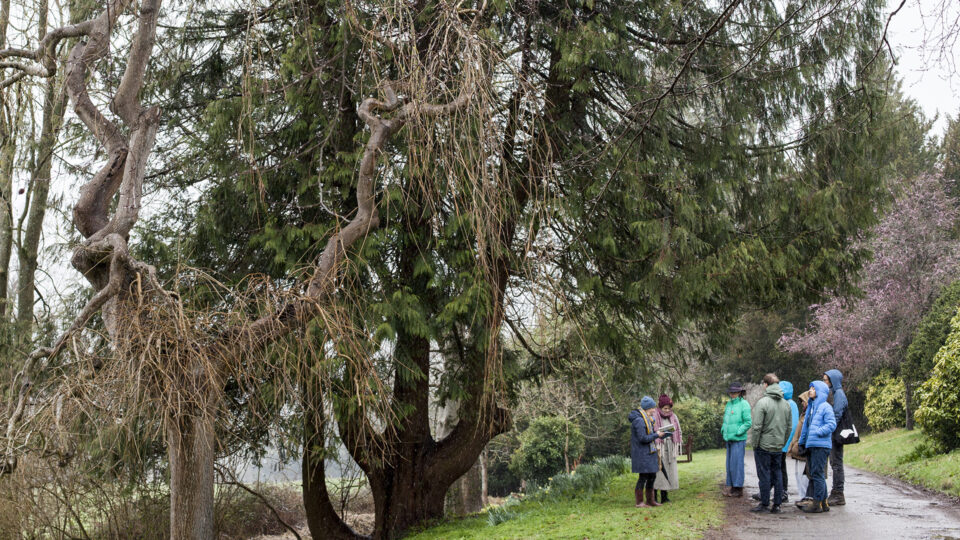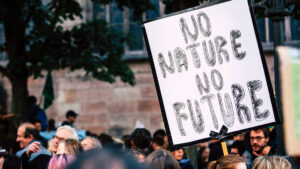- Posted on November 3rd, 2023
Reflections – How Can Cultural Organisations Adapt to Climate Change?

In the UK we’re already seeing hotter summers, warmer wetter winters and increased weather extremes. These changes are affecting our health, food security, and ecosystems. The recent Storm Babet serves as a glimpse into a future without climate adaptation. The devastating loss of homes and lives across much of Scotland and the North of England act as yet another wake up call, in yet another year of record-breaking climate impacts.
Together, we need to plan for adapting to the climate in the long-term and address the effects we are already seeing. We need to understand these impacts and cultivate cultural competencies and ethics within our communities to be able to act wisely.
In response to this need, Julie’s Bicycle hosted a Peer-Sharing group on 19th October, as part of Arts Council England’s Environmental Programme, to explore how culture might support adaptation to climate change.
In this blog, Arts Council England Environmental Programme team members, Hannah Graham, Becky Hazlewood and Vicky Sword-Daniels explain ‘Adaptation’ for those less familiar with the term, and share some insights from the cultural organisations and participants that joined the session.
What is Adaptation?
We now know that in order to reduce our emissions for the long term and secure a liveable future for all, we need to not only act to reduce our greenhouse gas emissions (mitigation), but to adapt to the impacts we are already experiencing as the climate changes.
Adaptation is about the shifts we need to make now and in the future to reduce vulnerability and build resilience against the impacts of a changing climate. This means preparing (mentally, physically, financially) to adjust what we do and how we do it to be able to continue to survive and thrive into the future.
The impacts of climate change are already being felt, particularly in developing countries who have contributed the least to global emissions. Our unjust systems have created vulnerable groups who are most exposed to the impacts of climate change with the fewest resources to respond. As we adapt, we need to understand and address the root causes of inequality and develop solutions collaboratively, with a focus on equity, inclusion and human rights. This means pooling people’s diverse knowledge, building capacity and agency to create solutions together that centre wellbeing and regenerative approaches for people and the planet.
“Adaptation requires an honest confrontation with the most inconvenient of truths, but that is preferable to the alternative, a half-hearted focus on mitigation that leaves us unprepared to live in a future of ecological carnage.”
Rupert Read in The Great Imagining Newspaper 2023.
Sharing Experiences From Across the Cultural Sector
The aim of the Peer Sharing session was to bring together those already incorporating climate change adaptation into their work. Attendees shared their experiences of how climate change is already impacting organisations and artists, and discussed approaches and responses. The gathering provided a confidential forum, which enabled participants to speak freely about their experiences. Insights shared below have been anonymised.
How Are Cultural Organisations Affected by Climate Change?
The participating organisations are already facing the stark reality of climate change impacts, including severe and frequent storms, sea-level rise, coastal erosion, and loss of nature.
As each person shared their experiences of how climate change is showing up for them, it became apparent that the group felt a shared sense or urgency on this issue, and a frustration that adaptation isn’t receiving the attention or investment it requires by decision makers.
Some participants found it tricky to prioritise adaptation because of other competing challenges such as investing in building upgrades, managing financial constraints, and emphasising attendance over integrating adaptation into agendas and strategic plans.
What Are Organisations Already Doing to Adapt to Climate Change?
Examples of Adaptation in Practice:
Reflecting on the issues raised, we identified some strategies and avenues from the work already being done:
- One organisation provided a brilliant example of long term planning, working on a 20 year strategy which used detailed local data to understand risks to their local area.
- Another participant discussed the idea of thinking in terms of ‘bioregions’, working in integrated ways with people at a local level towards system change, fostering collaborative solutions for adaptation, justice and resilience.
- From all of the participants, intergenerational engagement with local communities groups remains central to raising awareness of climate change impacts and building capacity for locally led action. Approaches to engagement included understanding local people’s experiences and connection to place as an entry point for starting conversations and co-creating solutions for adaptation. For example, this could involve reframing how culture refers to audiences, away from market customers and towards ‘community finders’ or programming new climate themed work that could spark conversations.
- Considering non-anthropocentric and indigenous approaches, and connecting people to nature and biodiversity solutions through cultural exhibitions and performances can be powerful, especially in urban environments where there is more of a disconnect between people and nature. A number of participants are working with young people, recognising young people’s voices must be heard as they will live through increasingly severe climate impacts. Balancing eco anxiety faced by some young people, whilst fostering hope and agency is sometimes a delicate task. Some organisations we spoke to are working on programmes which build the capacity of young people through campaigning, providing inspiration and creating spaces for them to actively contribute to the environmental crisis conversation.
- At the core of all the engagement approaches discussed was the need for honesty and understanding regarding the nature of the impacts people are facing.

So, What Did We Learn About Adaptation From the Peer Sharing Event?
The Headlines:
- Networks and Knowledge Sharing: The organisations we spoke to were hungry for more peer sharing opportunities, information and discussion on the topic of adaptation. There was a common understanding that adaptation and resilience is something that needs to be considered in partnership with other local organisations, from both the culture sector and beyond.
- Locally-Led Responses: Building on the need for partnerships and networks, the participants spoke about the need to develop deep local knowledge and understanding of impacts. This means engaging local people and groups, to both understand the likely impacts and how to respond to them.
- Examples and Inspiration: Participants were interested in learning about more examples of cultural sector work on adaptation, understanding what has worked well and how to overcome challenges.
- Greater Advocacy and shared voice can build momentum for adaptation work.
- Education and Literacy: building awareness of the need for adaptation through upskilling and capacity building will support wider sector action and cross collaboration. There is also a need for a shared language, free from complex terms, to make this topic more engaging and accessible to wider audiences.
- Adaptation is an Opportunity for Wider Transformation and System Change towards more collaborative ways of living and being, and creating the wider systems changes that are needed to address the climate, nature, justice crises.
Next Steps: Get Involved in Climate Adaptation
We’re just beginning our journey in this critical topic, and we believe that collective action is the key to making a real impact. Here’s how you can get involved:
- Join Our Sessions: We will continue to host sessions and spaces for knowledge sharing and peer exchange. Your participation and insights are invaluable. Stay connected with us to be part of these discussions.
- Share Your Experiences: If you or your organisation are already working on adaptation and resilience, we’d love to hear from you. Your experiences and best practices can inspire and guide others. Reach out and share your story.
- Access Resources: We’ll be sharing case studies and resources on adaptation and resilience. These materials will provide practical insights and tools to help cultural organisations navigate the challenges of climate change.

